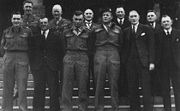
James Crichton (VC)
Encyclopedia

Victoria Cross
The Victoria Cross is the highest military decoration awarded for valour "in the face of the enemy" to members of the armed forces of various Commonwealth countries, and previous British Empire territories....
(15 July 1879 - 25 September 1961) was a soldier in the New Zealand Expeditionary Force
New Zealand Expeditionary Force
The New Zealand Expeditionary Force was the title of the military forces sent from New Zealand to fight for Britain during World War I and World War II. Ultimately, the NZEF of World War I was known as the First New Zealand Expeditionary Force...
, and recipient of the Victoria Cross
Victoria Cross
The Victoria Cross is the highest military decoration awarded for valour "in the face of the enemy" to members of the armed forces of various Commonwealth countries, and previous British Empire territories....
, the highest award of the British Commonwealth for gallantry "in the face of the enemy", during the First World War. Crichton was born in Ireland and served in the New Zealand forces but grew up in the hamlet of Northrigg by Blackridge, West Lothian, Scotland.
Biography
Crichton was born in CarrickfergusCarrickfergus
Carrickfergus , known locally and colloquially as "Carrick", is a large town in County Antrim, Northern Ireland. It is located on the north shore of Belfast Lough, from Belfast. The town had a population of 27,201 at the 2001 Census and takes its name from Fergus Mór mac Eirc, the 6th century king...
in County Antrim
County Antrim
County Antrim is one of six counties that form Northern Ireland, situated in the north-east of the island of Ireland. Adjoined to the north-east shore of Lough Neagh, the county covers an area of 2,844 km², with a population of approximately 616,000...
, naturalised as a New Zealander and joined the 2nd Battalion, Auckland Infantry Regiment, New Zealand Expeditionary Force
New Zealand Expeditionary Force
The New Zealand Expeditionary Force was the title of the military forces sent from New Zealand to fight for Britain during World War I and World War II. Ultimately, the NZEF of World War I was known as the First New Zealand Expeditionary Force...
during the First World War. He was awarded the Victoria Cross for his deeds on 30 September 1918 at Crèvecœur
Crèvecœur
Crèvecœur or Creve Coeur may refer to:* A French term for broken heart* Crèvecœur , a French chicken breed* Creve Coeur, Missouri, a suburb of St...
, France:
Private Crichton, although wounded in the foot, stayed with the advancing troops despite difficult canal and river obstacles. When his platoon was forced back by a counterattack he succeeded in carrying a message which involved swimming a river and crossing an area swept by machine-gun fire. Subsequently he rejoined his platoon and later undertook on his own initiative to save a bridge which had been mined. Under close fire he managed to remove the charges, returning with the fuses and detonators.
He later achieved the rank of sergeant
Sergeant
Sergeant is a rank used in some form by most militaries, police forces, and other uniformed organizations around the world. Its origins are the Latin serviens, "one who serves", through the French term Sergent....
. He died at Takapuna, New Zealand, on 25 September 1961.
External links
- Crichton J.
- New Zealand Troops who have won the Victoria Cross (brief biography details)

